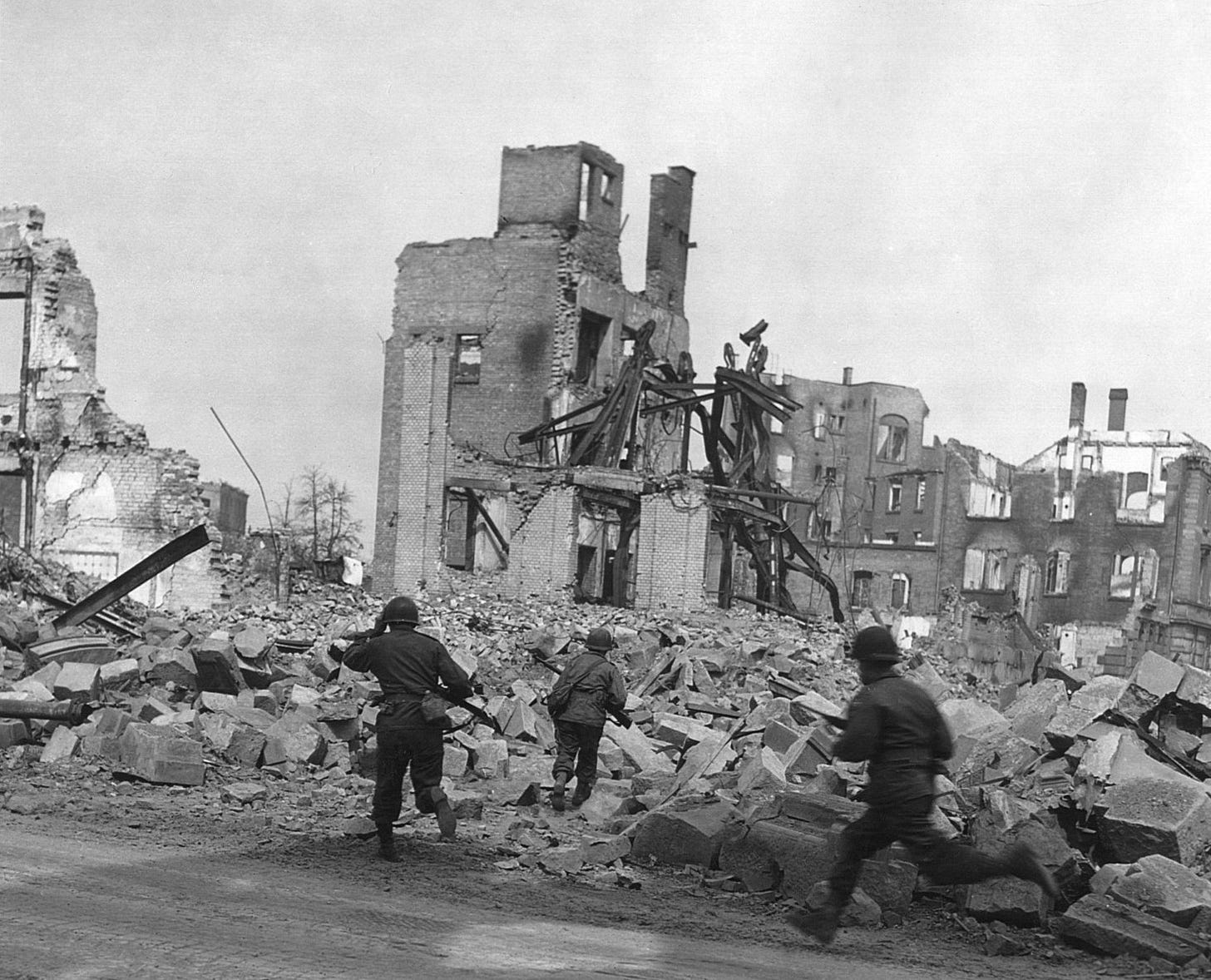Options for Israel
When the Least Bad is the Best Choice
Israel now is faced with several bad options. Destroying Hamas is imperative. The question is, how?
Non-violent options do not exist. Proponents of non-violence, who in fact offer no plausible concrete proposals, are either naïve or disingenuous and wish to see Israel defenseless and ultimately destroyed. Either way, to argue Israel cannot or should not use force is to argue that Israel must accept the horrors of 7 October. This is not a reasonable position.
Gulliver Bound
Israel has, for all its military might, little liberty of action. People who focus too much on its military capabilities miss the point that Hamas, Palestinians in general, and the world at large, have hemmed it in much as the Lilliputians tied down Gulliver. Hamas has done this by operating among and hiding behind civilians, and it has pushed claims of “ethnic cleansing” and “genocide” that global public opinion and major media outlets have swallowed unquestioningly. No other military operates under the same scrutiny, with every step criticized and second-guessed. The media coverage is uniquely disproportionate. Indeed, Hamas and the Palestinians have mastered what French strategist General André Beaufre has called the “external maneuver,” whereby weaker forces use non-military means to constrain their militarily stronger adversary’s liberty of action, thereby negating its greater military strength. This has included “lawfare,” propaganda, and using international forums to delegitimize Israel and shape public opinion.
What this means is that, in Castexian terms, Israeli strategy must contend with crucial “servitudes.” These include the need to maintain the support of Western allies, the United States foremost among them. There also are legal and moral servitudes, although the real issue is public opinion, and Israelis are tempted to scorn others’ judgment because of the perception that the world will condemn Israel regardless of how careful it is. To paraphrase Golda Meir, Israelis prefer to live and be damned in people’s eyes than to be killed.
Why a ground operation is a bad option
Urban warfare—which is the primary option on the table—is radically destructive. There is no way to fight in an urban environment without applying significant firepower, blowing up buildings, and, if there are civilians around, killing a lot of them even if they are never the actual targets. Even the best trained and most careful military force, no matter how committed it is to adherence to the laws of armed conflict, and no matter how good its intentions, will kill a lot of people. This a fact born out of even a cursory review of military history.
The only real way to mitigate significant civilian casualties is by evacuating people from the combat zone. This is particularly challenging in Gaza due to 1) the small geographic space involved, 2) the unwillingness of anyone who can provide safe refuge (Egypt) to do so, 3) Hamas’s clear interest in maximizing civilian casualties, and 4) international opposition to the very idea of removing Gazan civilians (who claim they are being “ethnically cleansed”).
Israel has an additional problem. The spectacle of an urban fight will make more likely a large-scale intervention by Hezbollah, which can devastate northern Israel, and which can only be countered by an invasion of Lebanon that itself will be devastating. The prospect of such a war increases pressure on the part of Israel’s Western allies to wish to put a break on Israel's military action. Besides, we can assume that anything Israel does in either theater will be viewed by many as “disproportionate.”
It is also true that a ground operation might not in fact destroy Hamas, even if it does significant damage to its capabilities in Gaza. A chief reason for this is that Hamas’s leadership is not in Gaza but rather is safe and out of harm’s way in Qatar, Turkey, and elsewhere. Also, far too many Palestinians, although there is no way to know precisely how many, will be willing to take up Hamas’s flag and resume the conflict.
Finally, a ground invasion may spell the death of the 200 Israeli hostages Hamas seized on 7 October.
What about limited operations?
Another realistic option is to not launch a major ground operation and settle instead for raids and so-called targeted operations. Israel already has been doing this, more or less, since 7 October. This option has the chief advantage of reducing the risk of a broader regional war and the danger of alienating allies. Moreover, fewer civilians will die.
This option has several disadvantages. Namely, limited operations would not spell the end of Hamas’s military capabilities, as all the previous Israeli military operations in Gaza have shown, nor will they end the suffering of Gazan civilians. Hamas is too well-entrenched thanks to its underground structures. Moreover, as global responses to Israeli actions since 7 October have shown, these, too, enrage global opinion and appear “disproportionate” in critics’ eyes. None of Israel’s critics will reason, “well, this is bad, but it’s better than a ground operation.”
Politically, a limited response might be unviable: Most Israelis, reeling from the massacres of 7 October, want to see something more decisive. We also must take into consideration the lessons of Israel’s 2006 war with Hezbollah: Airstrikes and targeted killings are not a substitute for having ground forces assault and hold territory.
Any out of the box options?
For Israel, it is crucial that it find a way to regain the initiative. Everything it has done since 7 October, and indeed for much of the past 20 years, has been reactive. Ideally, it should also find ways to restore its liberty of action, though this is hard given the nature of the constraints against it. This may be the best reason not to commit to a major ground operation: It is precisely what Hamas wants. If there are ways to hit Hamas but to do so in ways Hamas does not expect, they should be pursued. But what might those be?
Any idea I can come up with would carry profound risk without improving Israel’s chances of success. For example, Israel could avoid going into Gaza while striking instead at Hamas’s sponsors. The obvious targets are Iran and Qatar. Such an approach might make a broader regional war more likely than a major ground operation.
Israel could also just do nothing. This might well surprise Hamas, which Hamas clearly has been counting on sparking a major war. It could attempt to seize the moral high ground and announce, “to avoid further suffering, we shall do nothing and await Hamas’s release of its hostages.” There is an appealing logic to this, yet it seems unreasonable to expect any country to do such a thing, especially given the horrors of 7 October. I also suspect this would provide Hamas with an unexpectedly cost-free victory.
Back to a ground operation
If we accept the idea that Hamas must go, a ground operation is the least bad option given the greater likelihood of achieving the objective of breaking Hamas, unless one judges that the above-mentioned servitudes are too great. That would be a pity, as it would mean, in effect, that Hamas will have acquired impunity. Strategically, this would be intolerable. If Israel is to launch a major ground operation, it would be prudent to do several things at the same time (remember, the external maneuver):
1. Articulate clearly that Israel does not seek to displace permanently Gazans; any who leave will be allowed to return.
2. Strongly make the public case that Israeli forces are fully committed to operating within international law. Comments by Israeli officials suggesting otherwise are extremely unhelpful.
3. Argue for the restoration of Palestinian autonomy in Gaza following ground operations.
4. Crackdown on violence perpetrated by settlers in the West Bank.
5. Reaffirming commitment to a two-state solution. This might be possible now that Israel has a unity government.
6. Showing itself to be more concerned about Gazan’s plight, which would include providing food, etc. Yes, Hamas will redirect aid, etc., but in this conflict, public image is more important.
Another thing Israel should consider is issuing an ultimatum: Surrender and release the hostages or be invaded. Hamas no doubt would refuse, but that’s not the point. I believe Israel should have done this on 8 October.
Conclusion: Things will get worse before they gets better, if they ever do
One can have no illusions about what’s coming these next few weeks and months. Bloodshed. Violence. The risk of a broader regional war. This all could have been avoided. Tragedies, by definition, result from the choices of their protagonists. The Greeks cast these bad choices in terms of destiny. Tragedy had to happen. I am not that pessimistic. Nothing that’s happened had to happen. Regardless, we are where we are. To cite Pascal, “one has to bet: it is not voluntary, you are already embarked.” Hamas declared war on 7 October. Les jeux sont faits.




Very powerful analysis. One thing that could be tried would be a peace initiative with the following items:
* Freeing all hostages
* Hamas accept to be dismantled
* Ceasefire
* transfer of all Hamas prisoners currently detained on Israel to the ICC (or an equivalent international body)
* ICC must review every previous conviction and handle the prosecution of every prisoner not yet convicted.
* People not convicted by the ICC or to a shorter term than in Israel are generously compensated by Israel (150 $ per extra prison day)
* Free access to Gaza by the ICC to investigate and prosecute war crimes related to 7 October events
* Gaza strip is administered under the Vienna 4 policemen system
* Every month the country in charge change
* I propose EU / Egypt / Brazil / Kenya, but you can have one very bad guy in the mix (China ?) like USSR in Austria
- Free movement of people and goods with Egypt, guaranteed (Egypt would ratify some kind of extension to the ICC in order to be complied to arrest and hand to the ICC any war criminal)
- Free movement of goods with Israel, guaranteed
- heavy subsidisation of Gaza strip infrastructure development
Hamas would never accept but at least anyone who promote such a plan gain the moral high ground
Excellent analysis of a complex matter.